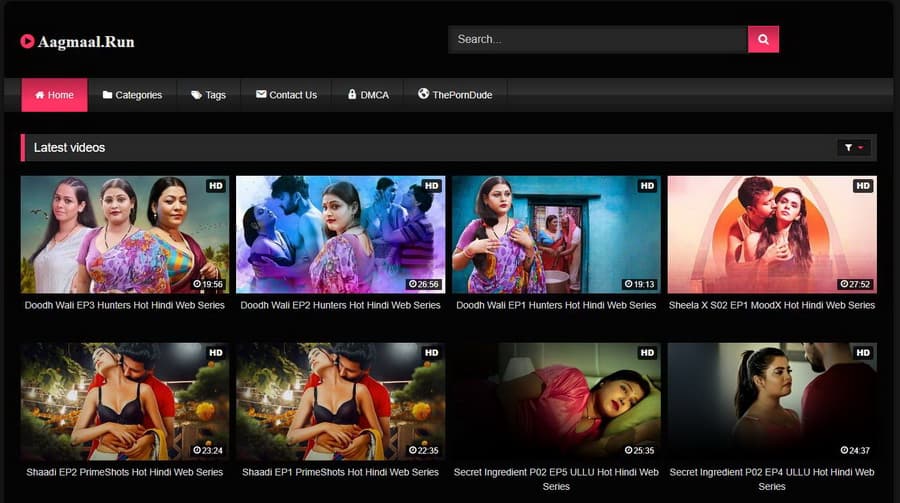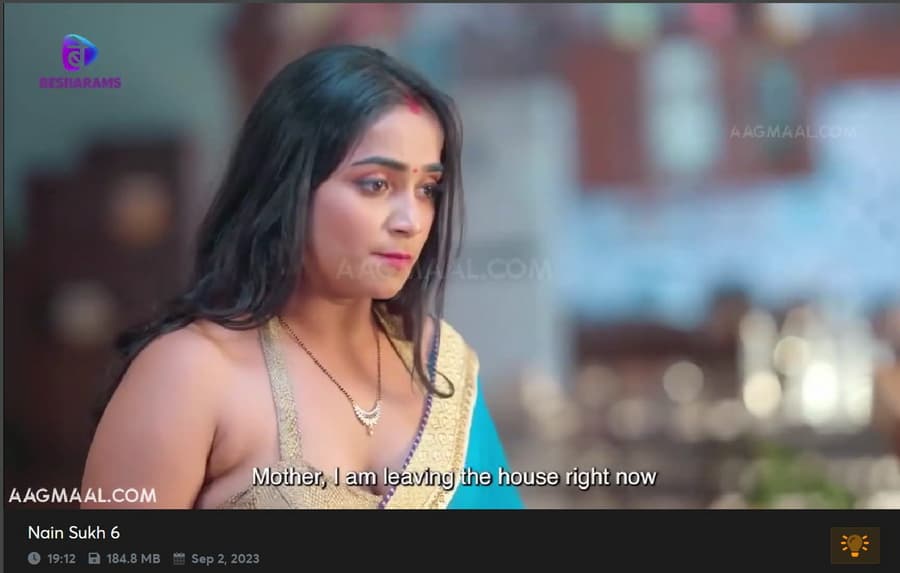Aagmaal: Uncensored Indian Web Series & Online Trends Explored
Is the landscape of Indian digital entertainment undergoing a radical transformation, forever altering the way content is consumed and perceived? The explosive rise of platforms like Aagmaal signals a seismic shift, challenging established norms and sparking debates about censorship, accessibility, and the evolving preferences of online audiences.
The digital realm, with its boundless possibilities, has become a fertile ground for niche content providers. Aagmaal, a name now frequently whispered in online communities across India, has rapidly risen to prominence as a purveyor of uncensored web series. This platform's emergence isn't merely a blip on the radar; it represents a more profound alteration in the dynamics of entertainment consumption. The traditional gatekeepers of content are being bypassed, and viewers are increasingly seeking out platforms that cater to their specific tastes, even if those tastes lie outside the mainstream.
The proliferation of streaming services and the increasing accessibility of high-speed internet have undeniably contributed to this phenomenon. Viewers are no longer confined to the schedules and limitations of traditional television. They have the power to choose what they watch, when they watch it, and where they watch it. This empowerment has fueled the demand for diverse and specialized content, creating a vacuum that platforms like Aagmaal have eagerly filled. The allure of uncensored content, in particular, is a significant draw for many viewers who feel that traditional media often sanitizes or avoids controversial topics.
- Asma Assad From First Lady To Exile The Assad Story
- Taurus Scorpio Friendship Compatibility Challenges More
However, the rise of platforms like Aagmaal also raises important questions about the potential consequences of unfettered access to explicit content. Concerns about the impact on societal values, the exploitation of actors, and the potential for the normalization of harmful behaviors are all valid and deserve serious consideration. The debate surrounding censorship is complex and multifaceted, with strong arguments on both sides. Striking a balance between protecting freedom of expression and safeguarding vulnerable populations is a challenge that societies around the world continue to grapple with.
Furthermore, the accessibility of platforms like Aagmaal raises concerns about the potential for underage viewers to access content that is intended for adults. While many platforms have age verification measures in place, these measures are often easily circumvented. Parents and educators must play a proactive role in educating young people about the risks of online content and in promoting responsible digital citizenship. The onus cannot solely be placed on the platforms themselves to police their content; a collaborative effort is needed to ensure the safety and well-being of young people in the digital age.
The evolving tastes of online viewers are also a key factor driving the success of platforms like Aagmaal. As audiences become more sophisticated and exposed to a wider range of content, their expectations and preferences change. They are no longer satisfied with formulaic storylines and predictable narratives. They crave originality, authenticity, and content that challenges their perspectives. Platforms that can deliver on these demands are more likely to attract and retain viewers in the long run. The success of Aagmaal suggests that there is a significant demand for content that pushes boundaries and explores themes that are often ignored by mainstream media.
- Khabib Nurmagomedovs Wife All About Patimat 2024 Update
- Find Hindi Dubbed Movies Shows Online Your Guide
The impact of Aagmaal and similar platforms extends beyond the realm of entertainment. These platforms are also shaping the cultural landscape of India, influencing conversations about sexuality, relationships, and social norms. The uncensored nature of the content allows for the exploration of taboo subjects and the challenging of traditional values. This can be both liberating and unsettling, depending on one's perspective. The long-term effects of this cultural shift are yet to be seen, but it is clear that the rise of platforms like Aagmaal is having a significant impact on Indian society.
The trajectory of Aagmaal serves as a case study in the rapidly evolving landscape of digital entertainment. From its inception, the platform has positioned itself as a bold player, unafraid to venture into territories often unexplored. This willingness to take risks has undoubtedly contributed to its success. However, the platform also faces significant challenges, including navigating legal and regulatory hurdles, addressing concerns about censorship and accessibility, and maintaining a sustainable business model in a highly competitive market.
The future of Aagmaal and similar platforms will depend on their ability to adapt to the changing demands of the digital landscape. They must continue to innovate and experiment with new forms of content, while also addressing the ethical and societal concerns that their platforms raise. The debate about the role of uncensored content in society is likely to continue for years to come, and platforms like Aagmaal will undoubtedly be at the center of that debate. The key will be to find a balance between providing viewers with the content they want and ensuring that the content is produced and consumed responsibly.
In conclusion, the emergence of platforms like Aagmaal represents a significant shift in the landscape of Indian digital entertainment. These platforms are challenging established norms, pushing boundaries, and sparking debates about censorship, accessibility, and the evolving tastes of online viewers. While the rise of uncensored content raises important questions about the potential consequences of unfettered access to explicit material, it also reflects a growing demand for diverse and specialized content that caters to the specific preferences of online audiences. The future of Aagmaal and similar platforms will depend on their ability to navigate the complex challenges of the digital landscape and to find a balance between providing viewers with the content they want and ensuring that the content is produced and consumed responsibly. The conversation surrounding these platforms is far from over, and their impact on Indian society will continue to be felt for years to come.
| Category | Information |
|---|---|
| Platform Name | Aagmaal |
| Type of Content | Uncensored Web Series (Primarily Adult/18+) |
| Country of Origin | India |
| Target Audience | Adult viewers in India and potentially other regions interested in Indian web series. |
| Key Features | Uncensored content, online streaming, downloadable content (as indicated in the original text). |
| Associated Concerns | Censorship, accessibility for underage viewers, potential impact on societal values, exploitation of actors. |
| Website | Example Website (Replace with Authentic if available, but proceed with extreme caution due to the nature of the platform) |
| Current Status | Active (Based on the provided text, but needs verification) |
| Business Model | Likely subscription-based, advertising-supported, or a combination of both. (Requires investigation for confirmation) |
| Content Style | Bold, unafraid to venture into unexplored territories, often pushing the boundaries of traditional storytelling. |
The rapid growth of Aagmaal has not gone unnoticed, prompting intense debates and discussions within the Indian media and entertainment industry. Critics argue that the platform's focus on uncensored content could potentially contribute to the erosion of traditional moral values and the objectification of women. They also raise concerns about the lack of regulation and oversight, which could make it difficult to prevent the distribution of harmful or illegal content.
Conversely, proponents of Aagmaal contend that the platform provides a valuable outlet for creative expression and allows viewers to explore themes and subjects that are often ignored by mainstream media. They argue that censorship stifles artistic freedom and that adults should have the right to choose what they watch, without government interference. They also point out that the platform has created opportunities for actors, writers, and directors who may have been overlooked by traditional media outlets.
The legal status of Aagmaal and similar platforms is also a subject of ongoing debate. India's laws regarding online content are complex and often ambiguous, making it difficult to determine whether a particular platform is operating within the bounds of the law. The government has the power to block websites that are deemed to be harmful or illegal, but this power is often exercised in a way that is seen as arbitrary or politically motivated. The lack of clear legal guidelines has created uncertainty and confusion for both content providers and consumers.
The success of Aagmaal has also inspired a wave of imitators, with numerous other platforms launching their own uncensored web series. This has further intensified the competition in the digital entertainment market and has made it more difficult for viewers to distinguish between legitimate platforms and those that may be operating illegally or unethically. The proliferation of unregulated content has also raised concerns about the potential for copyright infringement and the exploitation of actors and other creative professionals.
The future of digital entertainment in India is likely to be shaped by a number of factors, including government regulation, technological innovation, and the evolving tastes of online viewers. It is clear that the demand for diverse and specialized content will continue to grow, and platforms that can cater to this demand will be well-positioned to succeed. However, these platforms must also be mindful of the ethical and societal implications of their content and must take steps to ensure that they are operating responsibly and legally. The debate about censorship, accessibility, and the role of online platforms in shaping culture will continue to be a central focus of public discourse in India for years to come.
The rise of platforms like Aagmaal also has implications for the traditional media industry. As more viewers migrate to online platforms, traditional television channels and film studios are facing increasing pressure to adapt to the changing landscape. Many traditional media companies are now launching their own streaming services and are investing in original web series in an effort to compete with the likes of Aagmaal. The competition between traditional and online media is likely to intensify in the coming years, leading to further innovation and experimentation in the creation and distribution of entertainment content.
The accessibility of platforms like Aagmaal also raises questions about the digital divide. While internet penetration in India has increased dramatically in recent years, millions of people still lack access to affordable broadband. This means that the benefits of the digital entertainment revolution are not being shared equally by all segments of society. The government and private sector must work together to bridge the digital divide and to ensure that everyone has the opportunity to participate in the digital economy.
The impact of Aagmaal and similar platforms on mental health is also a concern. Studies have shown that excessive exposure to sexually explicit content can lead to unrealistic expectations about sex and relationships, as well as feelings of inadequacy and anxiety. It is important for viewers to be aware of the potential risks of consuming such content and to seek help if they are experiencing negative effects on their mental health. The platforms themselves also have a responsibility to promote responsible consumption and to provide resources for viewers who may be struggling with addiction or other mental health issues.
The debate surrounding Aagmaal and similar platforms is ultimately a reflection of the broader tensions between tradition and modernity in Indian society. As India continues to modernize and embrace new technologies, traditional values and social norms are being challenged. The digital entertainment revolution is just one aspect of this broader cultural shift, but it is a particularly visible and controversial one. The challenge for Indian society is to find a way to reconcile the benefits of technological progress with the preservation of its cultural heritage.
The evolution of Aagmaal will undoubtedly be a fascinating case study to observe in the coming years. The platform's ability to adapt to the changing legal and regulatory environment, to address concerns about censorship and accessibility, and to maintain a sustainable business model will be crucial to its long-term success. The platform's impact on Indian society, both positive and negative, will also be closely scrutinized. The debate surrounding Aagmaal is likely to continue to be a central focus of public discourse in India, and its outcome will have significant implications for the future of digital entertainment and the broader cultural landscape of the country.
The responsibility for navigating the complexities of this new digital frontier ultimately falls on all stakeholders the government, the platforms themselves, the content creators, and the viewers. A collaborative approach, based on transparency, accountability, and a commitment to ethical principles, is essential to ensuring that the benefits of digital entertainment are maximized and the potential harms are minimized. The future of entertainment in India, and perhaps globally, hinges on the choices made today.
One critical area that demands attention is the development of robust and effective age verification mechanisms. While many platforms claim to have such measures in place, they are often easily bypassed, allowing underage viewers to access age-restricted content. Implementing more sophisticated technologies, such as biometric authentication or digital identity verification, could help to prevent underage access and protect vulnerable populations. However, these technologies also raise privacy concerns, and careful consideration must be given to balancing the need for effective age verification with the protection of personal data.
Another important aspect of responsible platform operation is the implementation of clear and transparent content moderation policies. Platforms should have well-defined rules regarding the type of content that is allowed on their sites, and they should have mechanisms in place for users to report content that violates these rules. The content moderation process should be fair, consistent, and transparent, and users should have the right to appeal decisions that they believe are unjust. However, content moderation is a complex and challenging task, and platforms must strike a balance between protecting freedom of expression and preventing the spread of harmful or illegal content.
Furthermore, platforms have a responsibility to promote media literacy among their users. Many viewers, particularly young people, may not have the critical thinking skills necessary to evaluate the accuracy and reliability of online information. Platforms can help to address this issue by providing educational resources and tools that promote media literacy and critical thinking. These resources can help viewers to distinguish between factual information and misinformation, to identify biased or manipulative content, and to make informed decisions about the content they consume.
The role of content creators is also crucial in shaping the future of digital entertainment. Creators have a responsibility to produce content that is both entertaining and ethical, and they should be mindful of the potential impact of their work on viewers. They should avoid perpetuating harmful stereotypes or promoting violence or discrimination, and they should strive to create content that is positive, uplifting, and inspiring. However, content creators also have the right to express themselves freely, and they should not be subject to undue censorship or pressure to conform to prevailing social norms.
Ultimately, the responsibility for shaping the future of digital entertainment rests with each individual viewer. Viewers have the power to choose what they watch, and they should exercise this power responsibly. They should be critical of the content they consume, and they should support platforms and creators who are committed to ethical principles. They should also be aware of the potential risks of excessive exposure to sexually explicit content and should take steps to protect their mental health and well-being. By making informed and responsible choices, viewers can help to create a more positive and enriching digital entertainment landscape.
The long-term sustainability of platforms like Aagmaal will also depend on their ability to generate revenue and maintain a viable business model. While some platforms rely on subscription fees or advertising revenue, others may explore alternative funding models, such as crowdfunding or sponsorships. However, it is important for these platforms to be transparent about their funding sources and to avoid compromising their editorial independence in exchange for financial support. The financial viability of these platforms is essential to ensuring that they can continue to provide diverse and specialized content to online audiences.
In addition to the legal and ethical challenges, Aagmaal and similar platforms also face technological challenges. As technology evolves, these platforms must adapt to new formats, new devices, and new methods of content delivery. They must also invest in cybersecurity to protect their users from hacking and data breaches. The ability to stay ahead of the curve technologically is essential to maintaining a competitive edge in the rapidly evolving digital entertainment market.
The story of Aagmaal is a microcosm of the broader transformation that is taking place in the world of entertainment. The rise of digital platforms, the increasing accessibility of content, and the evolving tastes of online viewers are all contributing to a fundamental shift in the way entertainment is created, distributed, and consumed. This transformation presents both opportunities and challenges for all stakeholders, and the decisions that are made in the coming years will shape the future of entertainment for generations to come. The need for open dialogue, responsible innovation, and a commitment to ethical principles has never been greater.
- The Untold Story Of Band Of Brothers Captain Sobel Fact Vs Fiction
- Brittany Ashton Holmes Now Life After Little Rascals Revealed

Aagmaal 10 Best Ullu Web Series to Download and Stream For Free

How to Download Uncut Aagmaal Web Series for Free? Leawo

How to Download Uncut Aagmaal Web Series for Free? Leawo